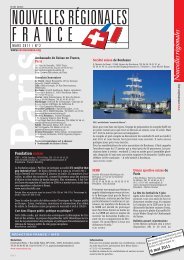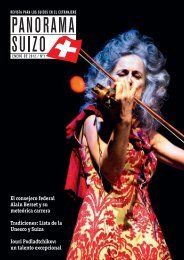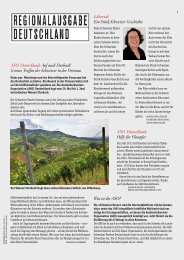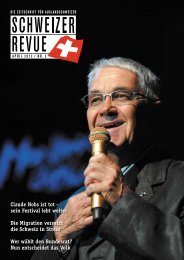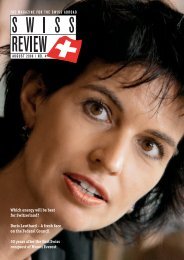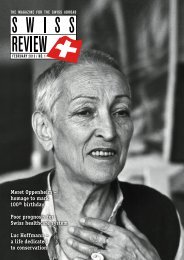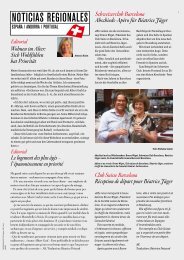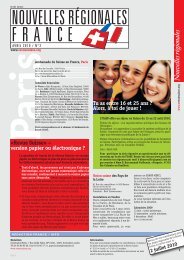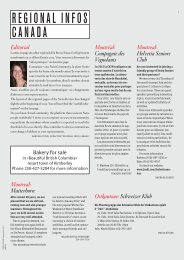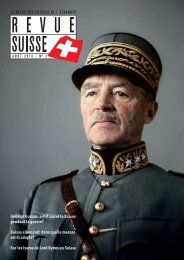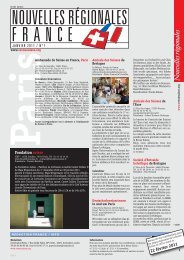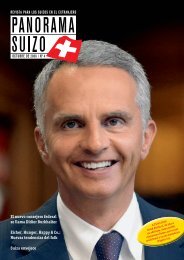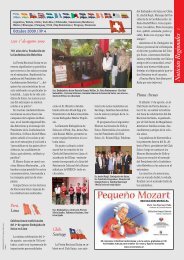Download PDF Swiss Review 1/2008
Download PDF Swiss Review 1/2008
Download PDF Swiss Review 1/2008
Create successful ePaper yourself
Turn your PDF publications into a flip-book with our unique Google optimized e-Paper software.
MAILBAG<br />
BOOKS<br />
5<br />
SWISS REVIEW February <strong>2008</strong> / No. 1<br />
Switzerland extends beyond<br />
the German-speaking part<br />
What are we to make of a<br />
“<strong>Swiss</strong> <strong>Review</strong>,” which is supposedly<br />
a publication for<br />
<strong>Swiss</strong> people abroad, when it<br />
is only a pale reflection of<br />
Switzerland and its diversity?<br />
Issue No. 5 for October 2007<br />
is a particularly good example<br />
of there being little of interest<br />
for French-speaking or Italian-speaking<br />
<strong>Swiss</strong> in the<br />
“<strong>Swiss</strong> <strong>Review</strong>”. You would<br />
think that Switzerland stops<br />
at the German-speaking<br />
boundaries! Apart from the<br />
fact that the editorial and all<br />
of the background articles,<br />
with the exception of one,<br />
were written in German and<br />
published as approximate<br />
translations, the topics too often<br />
overlook our country’s<br />
minority-language areas in<br />
spite of the intentions indicated<br />
by the front-page claim.<br />
A good example in this issue<br />
is the article by Rolf Ribi entitled<br />
“<strong>Swiss</strong> newspaper market<br />
in flux” which aims to carry<br />
out a “review of Switzerland’s<br />
newspaper landscape.” In the<br />
three pages that make up the<br />
article, only three lines address<br />
the situation of the<br />
press in French-speaking<br />
Switzerland, while Italianspeaking<br />
Switzerland is overlooked<br />
completely. Worse<br />
still, the drawing by a Frenchspeaking<br />
caricaturist (Chappatte),<br />
which is about a<br />
French-<strong>Swiss</strong> subject of national<br />
interest – the victory of<br />
the Alinghi catamaran in the<br />
America’s Cup – is published<br />
in German. It must be recognised<br />
that articles written by<br />
journalists of <strong>Swiss</strong>-German<br />
mother tongue determine<br />
how our country is looked at,<br />
limiting Switzerland to the<br />
German-speaking part. For a<br />
publication that is supposed<br />
to be for the <strong>Swiss</strong> abroad<br />
community as a whole, it un-<br />
fortunately does not reflect<br />
the rich diversity of all the<br />
country‘s parts.<br />
DAVID J. L. BONGARD<br />
Campaign advertising<br />
I already expressed my views<br />
against advertising by political<br />
parties in the “<strong>Swiss</strong> <strong>Review</strong>”<br />
in the run-up to the parliamentary<br />
elections. I was<br />
pleased to read the letter by<br />
Georg Ehret from the USA<br />
who was spot-on when he referred<br />
to “manipulation of voting.”<br />
Your editorial comment,<br />
“All parties were free to place<br />
ads” has to be considered in<br />
the light of the election report<br />
on page 14 where RR says:<br />
“It (the <strong>Swiss</strong> People’s Party -<br />
SVP) clearly has unlimited<br />
financial resources, which it<br />
does not have to disclose.”<br />
The right-wing political<br />
propaganda received as much<br />
“understanding” abroad as<br />
UBS’s loss of billions of francs<br />
or the infamous “grounding”.<br />
Both damage the image of<br />
“Idee Suisse”. Your publication<br />
should steer away from<br />
politics and focus on providing<br />
factual reports. Otherwise,<br />
the “<strong>Swiss</strong> <strong>Review</strong>” is OK.<br />
The report on Einsiedeln<br />
Abbey was very interesting.<br />
BRUNO NEIDHART, CONSTANCE,<br />
GERMANY<br />
Thank you<br />
As a <strong>Swiss</strong> person from<br />
abroad, I look forward to receiving<br />
each copy of the magazine,<br />
which keeps me up to<br />
date and in touch with my beloved<br />
Switzerland. I am privileged<br />
to know Switzerland<br />
and the first time I went, I discovered<br />
for myself what people<br />
say in Argentina: Switzerland<br />
is a tidy, clean,<br />
meticulous and friendly country<br />
– please keep it that way!<br />
Thank you!<br />
HUGO KLINKE, BUENOS AIRES,<br />
ARGENTINA<br />
In the course of the 20th century, war and tyranny cost more<br />
than 160 million people their lives. Confllict and mass destruction<br />
seem to be the fate of mankind. A small <strong>Swiss</strong> with<br />
a flowing white beard spent 60 years trying to stem the seemingly<br />
relentless tide of senseless killing: Max Daetwyler travelled<br />
half the world with his white flag, waging a non-violent<br />
campaign for peace.<br />
It all began on 5 August 1914 with a thoroughly un-<strong>Swiss</strong><br />
incident on the parade ground of Frauenfeld barracks, when<br />
fusilier Max Daetwyler, the second youngest of twelve children<br />
born to a respected family from Arbon in Eastern Switzerland,<br />
refused to take the oath of allegiance just as the<br />
First World War was breaking out. Responding to his commanding<br />
officer, this fusilier with six military refresher<br />
courses behind him said, “I am against the war. I will not<br />
swear the oath.“ He was the first <strong>Swiss</strong> man to refuse to take the<br />
oath, for which he was temporarily sent to a lunatic asylum and<br />
subsequently declared unfit for service. But this was to be the start<br />
of Daetwyler’s lifelong mission for world peace. With his legendary<br />
white flag, he travelled half the globe, preaching his grand idea of<br />
friendship and brotherhood in Moscow, Washington, New York, Geneva,<br />
Berlin and Cairo. His image went around the world. Time and<br />
again, Daetwyler would seek an audience with those in power, but<br />
neither in Moscow nor in Washington was he ever able to meet the<br />
great and powerful in person.<br />
While Max Daetwyler was dismissed by some as a deviationist<br />
fool, others marvelled at his selfless dedication and the depth of<br />
his conviction. His only moral authority was the voice of his conscience,<br />
which he followed throughout his life. And nothing could<br />
break his will and determination to campaign for an end to senseless<br />
wars throughout the world. He even served countless prison<br />
terms and submitted himself to six psychiatric assessments. It was<br />
not until after his death in 1976 that he was recognised as a <strong>Swiss</strong><br />
icon of the 20th century.<br />
Journalist Stephan Bosch has examined the extensive collection<br />
of Max Daetwyler’s personal effects in the Federal Archive in<br />
Berne and has written an extremely accurate, objective and entertaining<br />
biography entitled “Max Daetwyler: Der Friedensapostel“<br />
(Max Daetwyler: Apostle of Peace). He portrays a long life shaped<br />
by numerous dramatic events, family crises and an unceasing campaign<br />
for peace. Daetwyler’s biography has also become an important<br />
historical record, reflecting the thinking and world view of<br />
<strong>Swiss</strong> officialdom in the period from the First World War until the<br />
death of the Apostle of Peace. Attempts were repeatedly made to<br />
have Daetwyler committed for psychiatric treatment, but his local<br />
community in Zumikon defended their<br />
fellow citizen, pointing out, quite legitimately,<br />
that he was a man who did no-one<br />
any harm.<br />
Stephan Bosch’s book is as engrossing<br />
as a good novel.<br />
EC<br />
Voice of his conscience<br />
STEPHAN BOSCH: Max Daetwyler: Der Friedensapostel.<br />
Mit der weissen Fahne um die Welt.<br />
Rüffer & Rub, Zurich, 2007. Available in German<br />
only.



